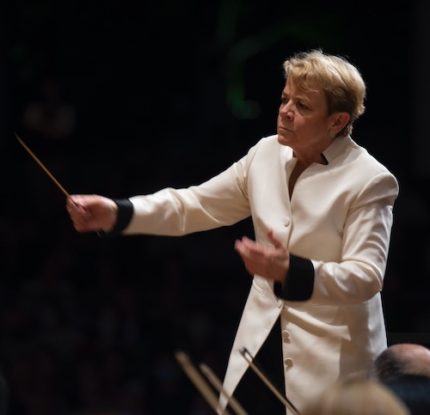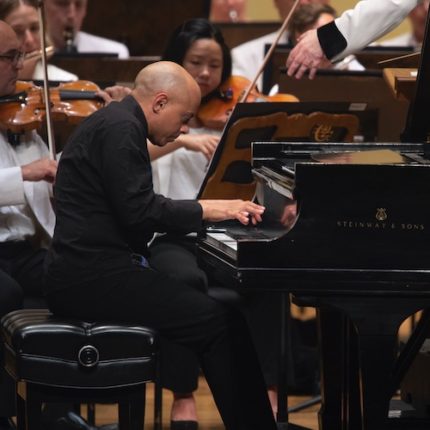Alsop, CSO open Ravinia with poignant tribute, Romantic favorites

The Chicago Symphony Orchestra opened its 2022 Ravinia summer residency with a program of Late Romantic favorites on Friday night. Little could the festival organizers have known that such a lush program would be just what the community needed at this time.
In his welcome at the top of the concert, Ravinia CEO Jeffrey Haydon emphasized the power of music to bring people together and help them heal. In light of the July 4th mass shooting in Highland Park, the orchestra began with a poignant rendition of Elgar’s “Nimrod” from his Enigma Variations, followed by a moment of silence to honor the victims.
Principal conductor Marin Alsop led the orchestra in a profound performance tinged with personal grief. The performance was made more striking by the gentle drone of cicadas in the background, who seemed to adjust their chirping to the tempo and pitch of the piece by the end.
Julia Perry’s Short Piece for Large Orchestra provided a jaunty and angular contrast to the sweeping lyricism of the Elgar. While performed at the Grant Park Music Festival last summer, the piece has never before been performed by the CSO or at Ravinia.
Alsop chose the work to highlight lesser-known female composers and musicians as part of her “Breaking Barriers: Women on the Podium” initiative. Perry, a mid-twentieth-century African-American composer, had a promising early career that was unfortunately stymied by acromegaly, a condition in which the body produces excess growth hormone. Numerous strokes left her partially paralyzed.
Written while she was studying in Italy in her twenties, Perry’s Short Piece is bursting with youthful energy. Perry packs a lot of ideas into the aptly titled seven-minute piece, making colorful use of the percussion section and different solo instruments, which Alsop brought out to great effect.
Rimsky-Korsakov’s beloved Scheherazade provided forty-five minutes of sumptuous escapism. Alsop was a powerful and communicative force on the podium, not only for the orchestra but also for the audience, who, with the help of video screens and expert camera work, got an intimate real-time view of the action. Alsop drew out a deliciously rich sound from all sections with her weighty gestures, particularly in the opening of the first movement as the sultan pontificates gruffly.
The acoustic of the Ravinia pavilion allowed the judiciously amplified winds and brass to soar across the stage more readily than in Orchestra Hall, which helped the numerous wind solos to carry with ease. However, some of the climactic moments verged on being overwhelming in their intensity. Alsop was often seen gesturing to bring down the sound of the back sections, but when the brass came out in full force in the climax of the finale, the peak dynamic was achieved too soon, giving the orchestra nowhere to go. Even the harp, by virtue of its position, was occasionally out of balance with the violin soloist.
As the narrative voice of Scheherazade, associate concertmaster Stephanie Jeong made a fitting leading lady. Her solos throughout were delicate and luminous, providing a welcome foil for the meaty sound of the rest of the orchestra. Her solo in the final movement was particularly heart-wrenching, the sustained senza vibrato high notes like a small voice piercing the air after the tumult of the shipwreck. The hearty standing ovations she and the other virtuosic soloists received were well deserved.

The CSO welcomed pianist Stewart Goodyear for Tchaikovsky’s Piano Concerto No. 1 on the second half of the program. The opening theme was stately but not ponderous and the strings’ unison playing was gloriously expansive. Still, under Alsop they threatened to overpower the piano during Goodyear’s demonstrative opening chords, and the soloist had to work hard to be heard in many of the louder sections. Fortunately, he possessed the muscularity and stamina needed to project through the rich texture.
Goodyear truly shone in the more intimate solo moments, demonstrating a delicate touch and sensitive voicing of melodic lines. The second movement was as crystalline as a music box, with Goodyear’s breathtakingly quiet trill evolving into flights up and down the piano that were light as air.
In the opening theme of the third movement, Goodyear took off running at a tempo that was a touch faster than what the orchestra had given him. The winds did very well to keep up with him in their interjections. Though some of the syncopated playing and tempo shifts felt slightly unstable at first, they quickly righted themselves, and the fast tempo provided for a thrilling performance. After such a test of endurance, made all the more difficult by the evening’s humidity, Goodyear looked rightfully exhausted.
Marin Alsop leads the Chicago Symphony Orchestra in music of Dvořák and Marcus Roberts 7:30 p.m. Saturday at Ravinia. ravinia.org
Posted in Uncategorized




